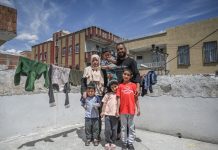A coalition of civil society organizations has called on the European Union to suspend funding to Turkish facilities implicated in human rights abuses.
Following a recent investigative report that alleges severe mistreatment of migrants and asylum seekers in EU-funded deportation centers across Turkey, three organizations — EuroMed Rights, the Human Rights Association (İHD) of Turkey and the Greek Council for Refugees — have called for an independent international investigation and a suspension of EU funding for implicated facilities.
They urge the EU to implement rigorous human rights assessments in all future agreements involving third countries and to enforce accountability mechanisms to prevent abuses.
The investigation, led by Lighthouse Reports in collaboration with media partners including El País, Der Spiegel and Politico, documented widespread abuse in Turkish repatriation centers funded in part by the EU.
According to the report, facilities managed by Turkish authorities have engaged in practices such as arbitrary detention, physical abuse, forced deportation to conflict zones like Syria and Afghanistan and denial of legal aid, leading in some instances to fatal consequences for detainees.
The report contends that EU funding, originally intended to support humanitarian needs, has instead been funneled into operations that perpetuate human rights violations.
Human rights lawyer Abdulhalim Yılmaz, who advocates for migrant rights in Turkey, detailed numerous barriers migrants face in seeking justice in these centers.
“Foreign nationals, even if they are victims of crime, are often afraid to file complaints or pursue legal action, fearing it could lead to repercussions against them,” Yılmaz said. “This climate of fear prevents many from exercising their fundamental rights.”
Yılmaz also mentioned specific incidents, particularly at the Çatalca Repatriation Center in İstanbul, where he claims authorities have refused to conduct investigations following reported abuse. He described a recurring pattern of concealing incidents rather than addressing them, enabling abusive practices to continue unchecked.
Among the documented practices, Yılmaz noted the use of “refrigerator rooms” — small, intensely cold isolation chambers — where migrants are allegedly confined as a form of intimidation or coercion, particularly to force signatures on so-called voluntary return agreements. He recalled an incident in February when nearly 50 detainees, including pregnant women and children, were confined to a basement at the Şanlıurfa Repatriation Center, deprived of access to legal representation and family members. “These practices lack any legal basis or oversight and are reportedly common in other facilities as well,” he added.
Since 2016, the EU has allocated over 11 billion euros in funding to support Turkey’s efforts to manage the flow of migration, with substantial resources directed toward enhancing its border control and containment infrastructure. Recently, the European Council signaled a shift toward more restrictive migration policies, prioritizing security and deportations over asylum protections.
Civil society organizations argue that this evolving stance risks further eroding migrant rights and increasing abuses, as Europe faces growing political pressure to curb migration.















